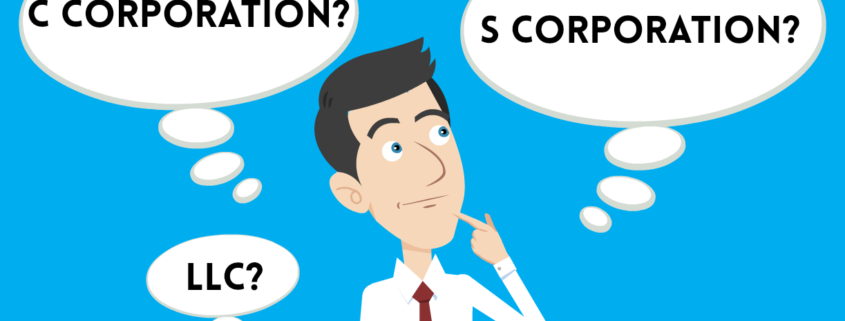Taxes are the most significant expense we have in life. And many business owners think about it when the tax season comes. When you meet your accounting or tax preparer in February or March, your accounting can’t make a difference on your tax return because the year is over. The best practice is to meet your accounting, CFO, or tax preparer at least once a quarter to do tax planning. Then, you can work together to reduce your tax bill.

What is Tax Planning?
Tax planning is the analysis of a business’s financial situation to ensure that everything works to allow you to pay the lowest taxes possible.
The tax planning will project your business’s income and expenses, so you know what you will most likely owe in taxes on April 15th.
Remember that you pay your taxes by April 15th, but you work on it throughout the current year.
Here are some key tax planning strategies you may apply to your company today.
1 – Choose the correct entity.

An entity is an organization created by individuals, individuals or other entities to run a business, such as LLC, Partnership, or Corporations.
Each entity is taxed differently, so it is essential to choose wisely. I’ll give some ideas about each one.
Limited Liability Company (LLC): It’s easy to open; you don’t need a lot of paperwork. It has personal liability protection, which means your assets don’t mix with your business assets. You must pay the Sel-employed taxes. The self-employed tax rate is 15,3%. The rate consists of 12,4% for social security and 2,9% for Medicare. The LLC can be a sole proprietor (with no partner) or Partnership (with a partner). It can be taxed as S-Corporation or C-Corporation.
Corporation
There are two types of corporations, S-Corporation and C-Corporation.
S-Corporation: S-Corporations are corporations that elect to pass corporate income or losses to their Shareholder for federal purposes. This means S-Corporations don’t pay taxes. Their results pass to the Shareholder, so they pay the taxes. It may have to pay state taxes. The Shareholders don’t pay self-employment taxes but must be on the payroll to collect social security and Medicare.
C- Corporations: C-Corporations is an entity in which the owners, or shareholders, are taxed separately from the entity. C-Corporation is a double taxation entity because the C-Corporation should pay 21% as corporate taxes (as of today). Also, if the C-corp pays their shareholders dividends, they must pay taxes over the dividends.
Always consult a professional to help you with what entity is the best fit for you.
2- Having a Good Bookkeeping

Many business owners overrate their bookkeeping. They think it’s not helpful. However, accurate and timely bookkeeping is one of the best tools for reducing taxes. To make a better decision and project your number correctly, you must have your bookkeeping up to date. So, you will have your balance sheet and profit loss without errors. Also, you can identify new deductions for your business based on them.
3- Keep Documentation
Always keep proper documentation to support your spending. Take a picture of every receipt and upload it to a cloud storage such as One drive or google drive. Keeping your documentation will also help you in case of an audit.
Other documentation you may keep are:
- Meeting minutes for your business
- Loan documents between you and your business.
- Loans documents from vehicle financing
- Loans documents from the warehouse financing
- Mileage Logs.
- Agreements between you and your business (for example, Augusta Rule).
4- Section 179
Section 179 of the IRS Tax Code allows businesses to write off the full purchase price of any qualifying equipment, software, or vehicle in the year it was purchased or financed. For example, if a business buys a $50,000 truck in 2022, it can deduct the entire $50,000.
Equipment or vehicle must be used more than 50 percent of the time for business purposes. The 2022 deduction limit is $1,080,000. The 2022 spending cap is $2,700,000.
It’s a good strategy to renew your vehicle or pieces of equipment and reduce your net income without decreasing your cash flow.
5- Augusta Rule
Augusta Rule is on the IRS as Section 280A. It allows homeowners to rent their homes for up to 14 days per year without reporting the rental income on their tax returns. It does not need to be consecutive.
The rental price must be reasonable for that location on that date. You cannot take advantage of this rule if you are a sole proprietor or single-member LLC. You need to have an S-Corp, C-Corp, or LLC taxed as S-Corp or Partnership and set up with a separate EIN. Also, If you use the home office deduction, you cannot take this deduction too.
Keep the documentation showing the reason to rent your home to your business. And to pay yourself from your company, transfer from your business account to your account or write a check.
6- Home office expenses
Small business owners may deduct rent, utilities, real estate taxes, repair, maintenance, and other related expenses if they use part of their home regularly and exclusively for business-related activity. For example, using a room for your office and a playroom for your kids makes you ineligible.
You can determine the value of your deduction the easy way or the hard way.
- With the simplified option, you aren’t deducting actual expenses. Instead, the square footage of your space is multiplied by a prescribed rate. The rate is $5 per square foot for up to 300 square feet.
- The standard, more complex method values your home office by measuring actual expenditures against your overall residence expenses. You can deduct mortgage interest, taxes, maintenance and repairs, insurance, utilities, and other costs.
You can use Form 8829 to figure out the expenses you can deduct.
7- Anticipate your expenses
Another excellent tax planning strategy is to prepay some of your next year’s expenses in December. Also, you can hold some income until next year. To use this strategy, you need to be on a cash basis with your accounting, not accrual. This strategy is to reduce your net income, consequently paying fewer taxes.
Also, you can use the business credit card in December, so you can write off the expenses in December but will pay the credit card next year. This strategy helps keep more money in your business and reduce your tax bill.
Bottom Line
Tax planning is a vital tool to save you money in taxes. Think about taxes like any other expense. At least every quarter, talk to your accountant, CFO, or Tax Preparer to know how your taxes are going. Please don’t wait until the tax season to worry about it. Otherwise, your may pay more taxes than you suppose.
__________________________________________________________________________
Did you like this blog article? You may like the ebook we published.
Download it, Here.
